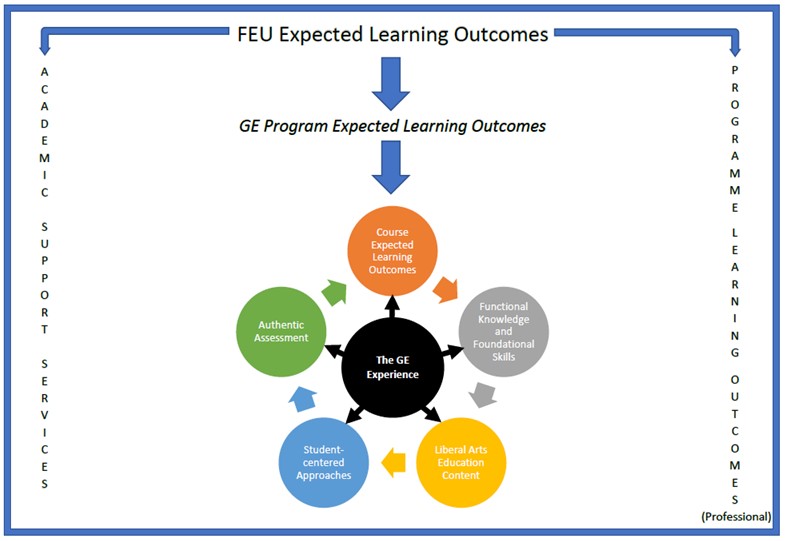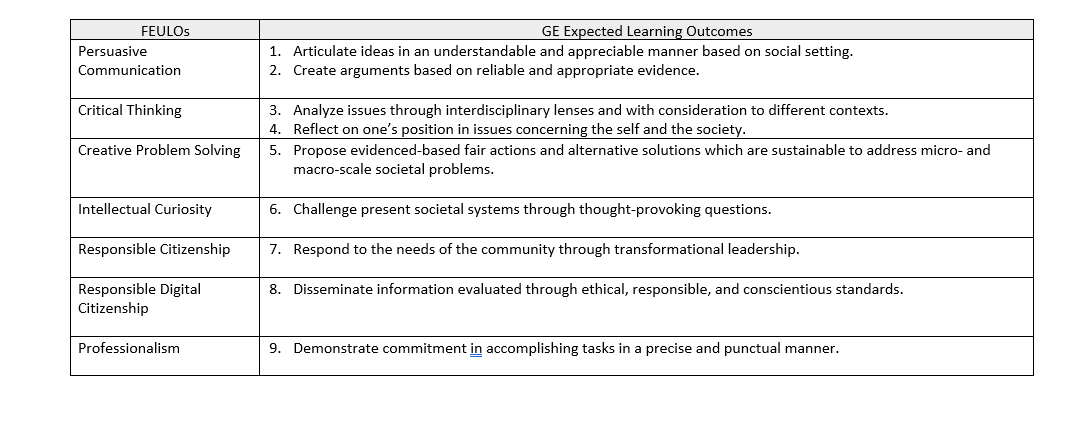The FEU General Education (GE) curriculum is composed of fifteen 3-unit courses which are taken during the first 2 years of the undergraduate programs of the university.
To contribute to students’ achievement of key learning outcomes, the GE curriculum has the following program features:
1. Macro- and micro-level constructive alignment
Demonstration of understanding in the GE curriculum is expressed through expected learning outcomes. The GE program has its set of students expected learning outcomes which aligns to the university’s expected learning outcomes and likewise serves as baseline for creation of course expected learning outcomes. Further, the course expected learning outcomes are the basis for the instructional design in terms of selection of skills and content to be learned, teaching-learning activities, and assessments.
2. Development of functional knowledge and foundational skills
GE courses are skill-based and thus focus on the facilitation of students learning of functional knowledge and foundational skills rather than only teaching and assessment of content. Content in the GE courses serve as a learning base and a medium for students to demonstrate skills such as idea generation, reflection, question formulation, synthesis, and contextualization among others.
3. Exposure to liberal arts education content
GE courses expose students to the ideas and methods of the humanities and the sciences. Being the vehicle used for students to demonstrate skills, the liberal arts education content is used to engage students into critical discussions and reflections on topics and issues of the humanities and sciences.
4. Facilitation of learning through student-centered approaches
Aligning to the Student-Centered Learning paradigm of the university, GE courses implement teaching-learning activities which allow students to co-construct knowledge. This is done through designing of learning environments and facilitation of activities which are aligned with expected learning outcomes and where students can think aloud and actively participate in the progress of their learning.
5. Conduct of authentic and alternative forms of assessment
Assessment tasks in GE courses are criterion-based and assess indicators of achievement of course expected learning outcomes through rubrics. Further, assessment tasks in GE are aligned with real world tasks and make use of varied tools instead of traditional paper and pencil tests.
The figure above is the thematic embodiment of the GE program features. This shows that GE Expected Learning Outcomes (GELOs) were formulated based on the FEU Expected Learning Outcomes (FEULOs) which were contextualized in the program features and kind of experience that GE ought to provide to students. Further, Course Expected Learning Outcomes (CELOs) in individual GE courses were crafted aligning to the FEULOs and GELOs which entail transferrable skills needed to be learned by students. Liberal Arts Education is used in designing instruction where content serves as a vehicle to demonstrate learning of skills through student-centered approaches and methods. Further, authentic and alternative forms of assessment are used to assess students’ achievement of learning outcomes and inform learners of critical gap.

In principle, all GE courses have the following features:
- Outcomes-based
- Skill-based
- Reading-based
- Output- and/or performance-based
- Make use of student-centered approaches and methods
- Utilize alternative form of assessments rather than traditional paper and pencil test
- Emphasize formative assessments which culminate to summative assessment
The GE Expected Learning Outcomes
The GE Expected Learning Outcomes (GELOs) are the set of key standards that students are expected to demonstrate after taking the GE courses. GE courses are identified to contribute to the achievement of selected GELOs and FEU Learning Outcomes (FEULOs). Below is a table showing the alignment of FEULOs and GELOs.

